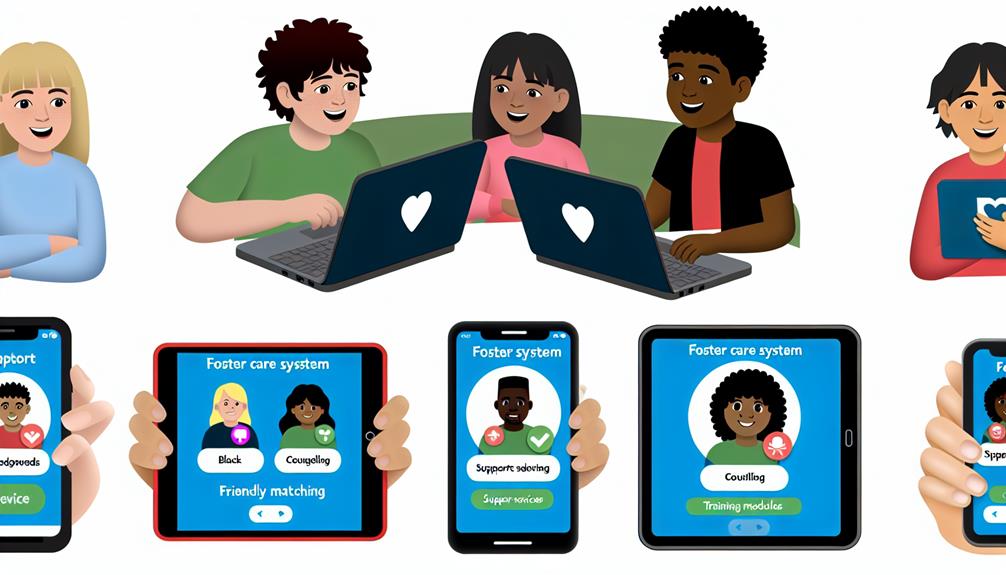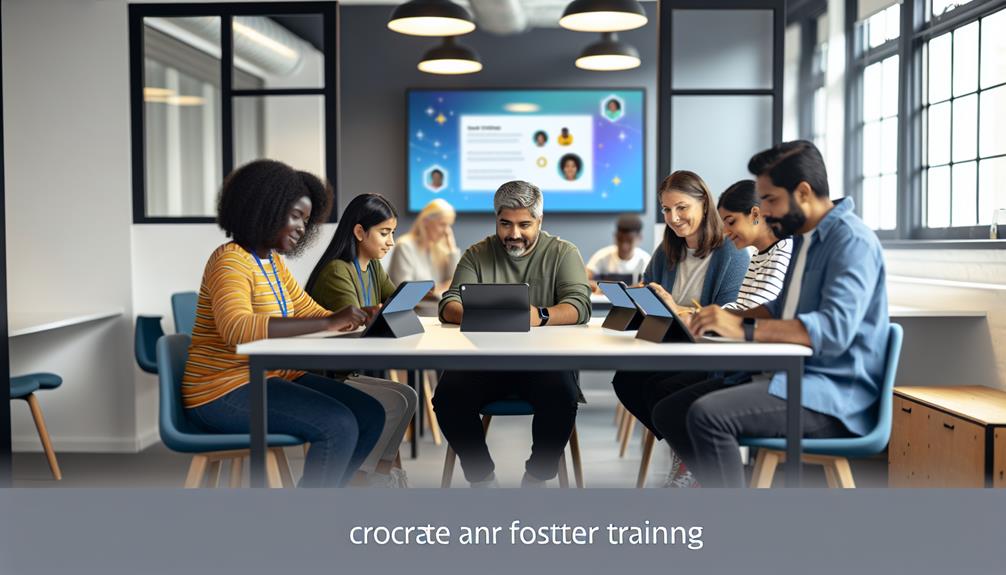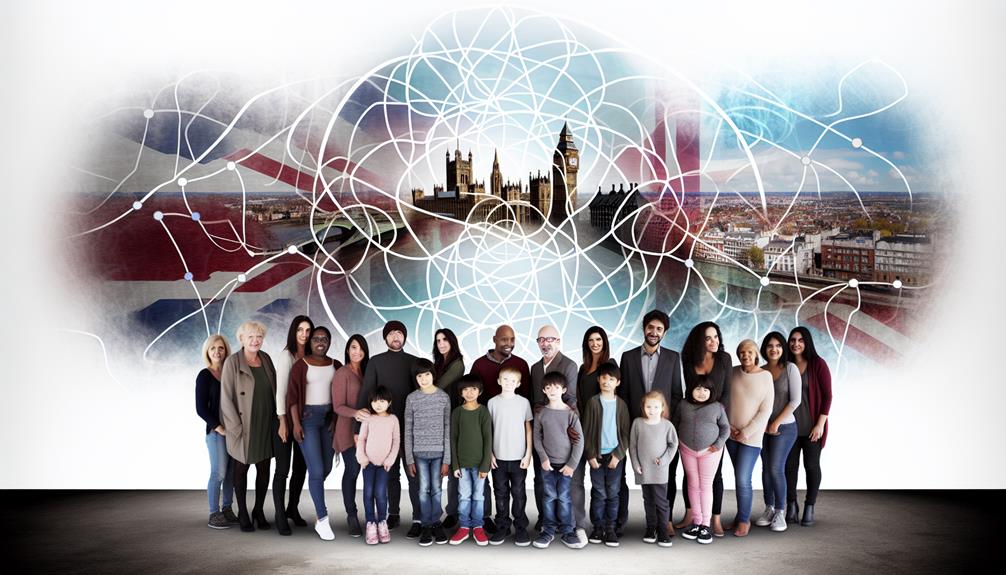The UK foster care system is pivoting with seven key innovations: Digitalisation is simplifying processes, making the system less time-consuming. Trauma-informed care is providing a safer environment for kids. Enhanced training programmes are supporting foster parents better. Predictive modeling in data analytics is improving placement outcomes. Legislation changes are enhancing foster rights while virtual reality integration is offering immersive therapy. Finally, the rise of foster care networks is boosting communal support. Each innovation is shaping a more effective, empathetic foster care landscape. There's an exciting world of transformation ahead, just waiting for you to explore.
Key Takeaways
- Digital transformation in UK foster care is improving vetting processes and enabling better matches through data analysis.
- Trauma-Informed Care provides a safer, supportive environment for foster children, acknowledging their neurological impacts.
- Enhanced training programs focus on resilience, emotional intelligence, and stress management, equipping parents for unique pressures.
- Data analytics in placement uses predictive modeling for outcomes, proactive issue resolution and transparency in decisions.
- Virtual Reality Integration offers immersive communication, empathy fostering, and a human-centric therapy approach for foster children.
Digitalisation of Foster Care Processes

In an era where almost everything is going digital, it's no surprise that the UK foster care system is also embracing digitalisation to streamline processes and enhance the overall experience for both foster families and children. This digital adoption is essential, not only for efficiency but also for improving the quality of placements.
One of the significant areas of digital evolution in the system is online vetting. It's a process that has been improved remarkably, making it easier for you to get through the initial checks. You'll appreciate the time saved and the speed with which you can become a potential foster parent. The reduction in physical paperwork is a blessing too, isn't it?
But digitalisation isn't just about streamlining processes; it's also about using data to make better matches between foster families and children. By analyzing the information available, the system can make thoughtful, informed placements that truly consider the needs of the child and the capabilities of the prospective foster parents.
In a nutshell, the digitalisation of the UK foster care system is a significant step forward. It's a move that empowers you as a foster parent, while focusing on the most important aspect – the wellbeing of the child.
Implementation of Trauma-Informed Care
You've probably heard of the term 'trauma-informed care', but what does it really entail?
In the context of foster care, it's a game-changer, shifting the approach from asking 'what's wrong with you?' to 'what's happened to you?'.
This empathetic shift not only creates a safer environment for foster children but also fosters better relationships and more positive outcomes.
Understanding Trauma-Informed Care
Exploring the domain of Trauma-Informed Care, it's essential to acknowledge its pivotal role in reshaping the UK foster care sector, fostering an empathetic approach that prioritises understanding over judgement. This framework equips you to comprehend the neurological impact of traumatic experiences on foster children, thereby enabling the development of effective trauma coping strategies.
By recognising how trauma can alter a child's brain development and behaviour, you're more able to create a supportive environment that promotes healing. Trauma-Informed Care isn't merely about recognising symptoms, it's about delving deeper to understand the root cause. It's about seeing the child, not just their behaviours.
Applying this understanding can transform your approach, making you not just a caregiver, but a catalyst for change in these children's lives.
Benefits in Foster Care
With the implementation of Trauma-Informed Care in the UK foster system, you'll discover an array of benefits, not just for the children under your care but also for yourself as a caregiver.
- Understanding and Empathy: You'll develop a deep understanding of the child's experiences, fostering empathy which is crucial in supportive parenting.
- Improved Child Behaviour: Children respond better to caregivers who understand their traumas, leading to enhanced behaviors.
- Reduced Stress: By knowing how to handle trauma reactions, you'll experience less stress and burnout.
- Foster Care Benefits: Being trauma-informed can lead to longer, more successful foster placements, truly benefiting all involved.
Enhanced Training Programs for Foster Parents

Over the years, significant strides have been made in improving the training programs for foster parents in the UK, guaranteeing they're equipped with the necessary skills and knowledge to provide the best care for their foster children. These advancements have taken a particular focus on parental resilience and emotional intelligence, key aspects that are crucial in fostering.
Parental resilience, the ability to bounce back from stress and adversity, is now being taught as an essential tool. You're taught strategies to manage stress, navigate challenges, and maintain a positive outlook, no matter the difficulties you might encounter.
Emotional intelligence, too, has become a focal point in training. As a foster parent, you're taught to understand, use, and manage emotions in positive ways. You learn to communicate effectively, empathize with your foster child's emotions, overcome challenges, and defuse conflict.
These enhanced training programs recognize the unique pressures you face as a foster parent. They aim to equip you with the skills and insight to not only manage these pressures but to thrive amidst them. This approach ensures you're better prepared to provide a nurturing, stable environment for your foster child. The result? A transformative impact on UK foster care, one family at a time.
Use of Data Analytics in Placement Decisions
In the domain of foster care, data analytics has emerged as a powerful tool that's reshaping how placement decisions are made. You can imagine how such decisions, once based solely on instinct or limited information, are now being driven by robust data analysis. This is where predictive modelling plays an integral role.
- Predictive modelling uses historical data to forecast outcomes, helping in pinpointing the most suitable foster homes for children. It's about making informed, analytics-driven decisions that bolster the chances of a successful placement.
- Leveraging data analytics, we can now identify patterns and trends, predicting potential issues and addressing them proactively. This foresight is invaluable in ensuring children's safety and well-being.
- The application of data analytics helps in enhancing transparency in placement decisions. It provides clear, objective insights that stakeholders can appreciate.
- Finally, the use of this innovative approach fosters efficiency. It streamlines the process, eliminating guesswork and reducing the time it takes to find the right home for a child.
The power of data analytics in foster care placement decisions is undeniable. It's a significant shift toward a future where every decision is backed by data, ensuring the best possible outcomes for children in the system.
Legislation Changes Boosting Foster Rights

You've seen how data analytics are revolutionising placement decisions, but let's turn now to the legal landscape.
Consider how recent legislative changes in the UK are amplifying the rights of those in foster care.
These reforms not only impact rights directly, but also introduce enhanced protection measures, fundamentally reshaping the foster care experience.
Reform Impact on Rights
Since the legislation changes, there's been a significant boost in foster rights, marking a transformative era in UK foster care. You've likely seen the impact of this.
- Rights awareness has skyrocketed, bringing light to the importance of safeguarding foster children's interests.
- Policy effectiveness has been amplified, with laws now more thorough and detailed in protecting these rights.
- Foster parents now have a heightened sense of responsibility and accountability.
- Finally, foster children are more empowered, with increased knowledge about their rights and how to assert them.
These changes aren't just about legalities. They're about enhancing lives, providing security, and fostering hope. This is the power of reform. It's not just about changing policies, but about changing lives.
Enhanced Protection Measures
Building on these reforms, enhanced protection measures have dramatically elevated the safeguarding of foster rights in the UK, offering a stronger shield against potential adversities. These carefully designed safety protocols provide you, as a foster parent, with a more solid foundation, ensuring the child's well-being is paramount.
Policy improvements have fortified your rights, giving you a louder voice in proceedings and decision-making. You're now better equipped to navigate the complexities of the foster system, thanks to increased training and support.
With these improvements in legislation, you're no longer just a caregiver; you're an advocate, a protector, a champion for these vulnerable children. So embrace these changes, they're transforming foster care in the UK, and most importantly, they're safeguarding your rights and those of the children in your care.
Integration of Virtual Reality in Therapy
While it may seem straight out of a sci-fi movie, the integration of Virtual Reality in therapy has become a groundbreaking innovation in the UK's foster care system. This Virtual Reality Adoption isn't just technological advancement; it's a leap towards a gentler, more empathetic method of addressing the emotional and psychological needs of foster children.
Therapeutic VR Applications are transforming the way therapy is delivered. Consider:
- *Immersion*: VR places you in a different world, allowing for a deep level of immersion that traditional therapy can't match. This experience could open doors of communication previously locked.
- *Empathy*: VR can simulate experiences, fostering empathy by letting you walk in someone else's shoes.
- *Control*: VR therapy puts you in control, which could be empowering for children who often feel helpless in their circumstances.
- *Safety*: VR provides a safe environment to confront and work through traumas.
These innovations aren't just about cutting-edge tech; they're about putting humanity at the heart of therapy. By integrating VR, we're not only embracing the future, but we're also making therapy more accessible, inclusive, and effective for foster children.
The Rise of Foster Care Support Networks

In a landscape where foster children often grapple with a sense of isolation and lack of support, the emergence of foster care support networks is a beacon of hope and solidarity. These networks are rapidly expanding, connecting foster families, professionals, and community supporters, creating a holistic system that bolsters care coordination.
Network expansion has been substantial, enabling more foster families to access resources and guidance. You're no longer alone in this journey; a vibrant community is right there with you, ready to provide support when you need it. These networks don't just offer a lifeline; they foster a sense of belonging, essential for both you and the children you care for.
Care coordination has been enhanced too, ensuring that every child receives the thorough support they deserve. Services aren't delivered in silos anymore; they're integrated, offering a more streamlined, personalized care approach. This means you have a team working with you, helping navigate the complexities of the foster care system.
Investing in these innovations isn't just about improving the foster care system; it's about empowering you, the carers, and most importantly, it's about transforming the lives of foster children in the UK. The rise of foster care support networks is a proof of this commitment.
Frequently Asked Questions
How Has the COVID-19 Pandemic Impacted the Foster Care System in the Uk?
You've seen pandemic protocols interrupt traditional foster care in the UK, with remote schooling adding further stress. Yet, it's also sparked innovative solutions, driving a transformation in how foster care operates.
What Are the Steps to Becoming a Foster Parent in the Uk?
Starting on the fostering journey is like getting ready for a marathon. You'll go through thorough foster training, navigate the adoption process, and meet strict criteria. It's challenging, but the finish line—changing a child's life—is worth it.
What Is the Average Length of Time a Child Stays in Foster Care in the Uk?
You're asking about the average stay in UK foster care. It's usually around 17 months. However, foster care challenges and adoption trends can influence this duration, making it shorter or longer for some children.
How Does the Financial Compensation for Foster Parents Work?
As a UK foster parent, you're compensated through allowances covering child care costs. However, compensation disparities exist among regions. Taxation rules apply too, so it's essential you understand these financial aspects thoroughly.
What Are the Psychological Support Mechanisms in Place for Children Transitioning From Foster Care to Adulthood?
You're not alone on this journey. UK provides robust support networks for you. Life skills training and psychological guidance are just a stone's throw away, ensuring a smoother shift to adulthood from foster care.
Conclusion
In the blink of an eye, the UK's foster care system is changing. Digitalisation, trauma-informed care, enhanced training, data analytics, legislative changes, VR in therapy, and rising support networks – all are playing their part.
What's next for foster care? Only time will tell. But one thing's for sure, these innovations are turning the tide. They're sparking hope, fostering change, and empowering lives.
Stay tuned – the best is yet to come.




